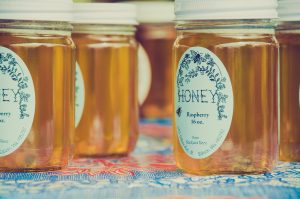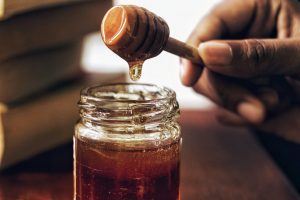Picking up a jar of honey at the supermarket, you’d imagine you could feel pretty certain of it’s ingredients. In fact it’s often listed on the side- ‘100% Honey’.
I was shocked to find out that often honey is not what you think it is. Despite labels promising pure honey, loopholes in international regulations mean that more often than not honey is either watered down or badly harvested. Bad for us, bad for the bees.
So what do the labels mean? Currently, packaged honey is broken down into three categories: Non EU Honey, a Blend of EU Honeys and Blend of EU and Non-EU Honeys. But what do these mean? Let’s break it down.

Chinese Honey- Not So Sweet
China is currently the world's largest honey exporter- supplying 50% of Europe’s Honey imports.
Often, this honey is harvested when it's ‘unripe’-a thin watery soup with little resemblance to the real deal. This is then dried down to a resin, transported and rehydrated much like fruit juices from concentrate.
Alongside this, there is a lucrative trade in watered down honey- driven by greed. Bad for us, bad for the bees.
Suppliers often add a variety of sweet or sugary syrups to stretch their honey supply. This can be difficult for quality inspectors to detect, as fraudsters have a bouquet of tricks up their sleeve.
As with doping in sports, it’s near impossible to keep up with the number of new nasties on the market. By flitting across the syrups added, these quick footed trixters often manage to evade detection.
This will be labeled Non-EU Honey. Our advice to you is to steer clear, and always buy local.
Sweet but Suspect
Honey has long been a favourite of nations all over Europe. Before the widespread introduction of sugar, it was the sweet staple of larders across the continent.
Nowhere is it more popular than in Greece.
Greek Gods were sustained by Ambrosia - the sacred golden sustenance which brought immortality to those powerful enough to consume it. Historians now widely consider this to have been a reference to honey- as Zeus was nursed by a nymph bee, Melissa. No one can beat the Greeks for their crazy tales!
Unfortunately, the life-giving substance was deadly to mortals- the tiniest drop was enough to turn their blood to fire and their bones to sand. Having consumed perhaps more than my fair share of honey, I can guarantee this is not true- perhaps someone thought it was a treat too good to share!
Honey is still widely used in Greece today, flavouring sweet treats such as Halva and Loukoumades. The average greek citizen consumes 1.7kg a year- thats 7 jars a piece!
Perhaps this ancient reverence for honey is what has motivated higher standards of honey in Europe.
The EU standards define honey as:
“the natural sweet substance produced by Apis mellifera bees from the nectar of plants […], which the bees collect, transform by combining with specific substances of their own, deposit, dehydrate, store and leave in honeycombs to ripen and mature”.
In other words- honey as we know and love it.
Unfortunately, there is a significant financial incentive for fraudsters who import non EU honey, re-package it and export as EU Honey. Again, this is challenging to detect, as European pollen can be used to mask or confuse the origin.
This will be labelled as a ‘Blend of EU Honeys’.
A blend of both- Not a made in heaven (or Mount Olympus)
With a label as ambiguous as a ‘Blend of EU and Non-EU Honeys’, it’s easy to be suspicious of this honey’s origins. Unfortunately, as with Chinese honey, this means it is unlikely to be the real deal.
What does Brexit mean for Honey?
From October 2022, British Honey will be labeled ‘Non-EU Honey’, making the origin and authenticity of your sweet treats even harder to discern.
The truth is, unless you buy directly from a local supplier, it’s near impossible to tell if the honey in your shopping basket is the real deal.

Luckily for us, Britain is buzzing with independent beekeepers.
You’d be hard pressed to find a town without a weekend farmers market- ideal for scouting out local honey. It can also be worth checking out local farms shops and health-food stores as they often work directly with beekeepers.
A personal favourite of ours is Bermondsey Street Bees. Founders Dale and Sarah keep hives all over London, with the aim of actively increasing biodiversity in urban spaces. To pick up a jar of their liquid gold, visit their website here.
Keep your eyes peeled for roadside stands and signs in windows- all of a sudden you’ll see honey for sale wherever you go. My Grandad sells the most delicious honey from his doorstep- for anyone out Newbury way I’d recommend you pay him a visit. Drop us a DM for his details.
I’m unbelievably lucky to have a beekeeper for a Grandad- and ever grateful for the honey supply this brings. But when my stocks run dry there's one thing I turn to- Dandelion Honey.
In cases where proper honey is hard to find, or you just fancy trying something new, we think you’d be mad not to try dandelion honey- vegan friendly, fun to forage and easy on the purse.
It has the same, rich sweetness, the same amber-gold glow- a doppelganger that would have the Feds fooled!
We’ll be making this with our members this Saturday at 10 in the Foodie Revolution. We can’t wait to see you there! Not in the Foodie Revolution? Email us to get on the waitlist and be sure to check out our Dazzling Dandelion blog for some seasonal recipe inspiration.
If you’re curious about the contents of your cupboard, why not try these fun honey authenticity tests- a playful way to start conversations with your kids about where their food comes from.
Make sure to share to save your friends from a store-cupboard scam and lend a hand to your local pollinators. Bee the Change!
My doctor recommended lemon and honey, to sooth the throat.
I wonder how this works?
According to Penn Medicine “Honey is one of the best remedies for a sore throat due to its natural antibacterial properties that allows it to act as a wound healer, immediately offering relief for pain while working to reduce inflammation." Which of course would make sense. Just make sure you get pure honey as this will work much better.
[…] week we opened the lid of the honey pot and were shocked to find that not all was as it seemed. As we continue our journey towards […]
[…] our Co Founders blog dunbunking outrageous myths about sugar? Or find out the shocking truth about Supermarket honey by our in house sustainability expert Alicia. Or let yourself go on a Foraging Fairytale journey […]
[…] Co Founders blog dunbunking outrageous myths about sugar? Or find out the shocking truth about Supermarket honey by our in house sustainability expert Alicia. Or let yourself go on a Foraging Fairytale […]
[…] blog dunbunking outrageous myths about sugar? Or find out the shocking truth about Supermarket honey by our in house sustainability expert Alicia. Or let yourself go on a Foraging Fairytale […]